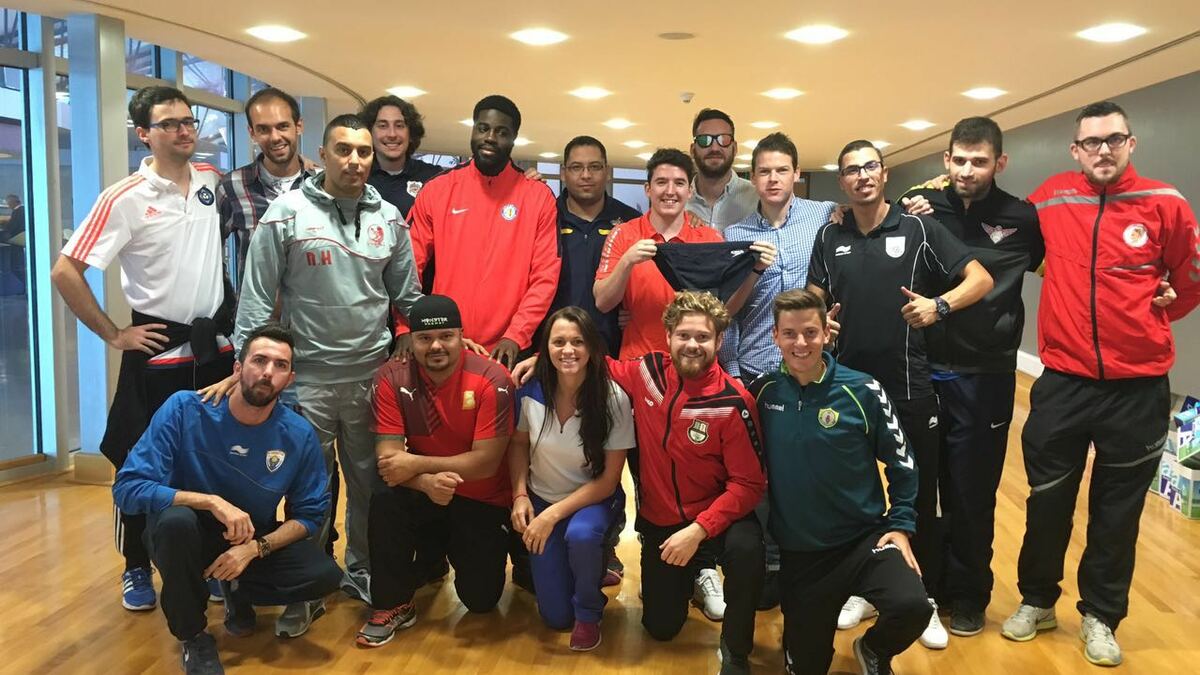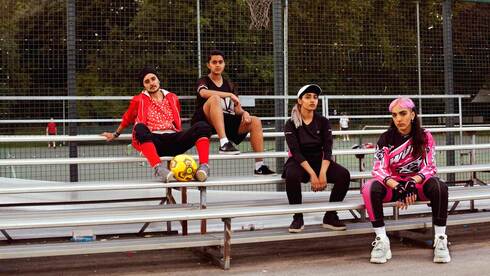More than a statistic the woman beating the odds to help Qatar’s National Football Team perform in the World Cup

I’m going to start this article with a hashtag spoiler alert – football is a man’s game. I know, shocker. Since Sky Sports’ sacking of Andy Gray for repeated sexism there’s been no shortage of sports mysogylypse (an apocalyptic implosion of ‘offside’ jokes, Kirsty Gallagher ‘lad bants,’ and old golfing elders banning women from clubs). But hopefully, some things are changing.
One positive sign is the work of Kimberley Stafford, originally appointed as head performance analyst for the Qatar Men’s National Football team, at a time when its performance has never been more crucial. Qatar’s hosting of the World Cup 2022 is not without controversy, conditions for workers and the disparate rights of men and women have dominated the global sports press, but as Kimberley says, “all eyes are on Qatar right now, I hope football can be a great vehicle for change”.
...all eyes are on Qatar right now, I hope football can be a great vehicle for change...
Perhaps her appointment is a start. One of only three women working as performance analysts in the top tiers of English football when she was recruited, Kimberley had experience being in the overwhelming minority in England. Bearing in mind that Man City FC employs more than 10 data analysts alone (all men) the Qatar Football team’s decision to actively recruit a woman, based partially on her gender, is more interesting.
Before we continue, I know “performance analysis” sounds a bit dry, as does “talent identification” (you should buy this player) and “asset management” (the erm, 'asset' is a person - are they any good, what’s going right/wrong) but as with Big Data generally, football data analysis and the ‘spreadsheet-wielding geeks’ are perceived as the future of sport, with universities charging £13,000 for a football analysis qualification.

So, firstly, if you’re a woman in England, how can you get there? Kimberley can only speak from her experience before her (4 years and counting) time in Qatar. “It helps to play the game,” she says. Not to a professional level, and not necessarily to do the job itself, but as a woman “the hurdles are that much higher for women, and playing the game adds to your credibility” in an atmosphere where cynics are looking to undermine it, to question what you really know. In every analytics job she has had, from working at Prozone, the leading performance analytics company, to a Premier League club, to the job in Qatar, it is the first question she is asked “have you played the game?” Would she be asked the question if she were a man? Certainly not, and along with being challenged as a woman, immediately at the outset of every role, this is just part of the tests which are laid along the way in a sport where all employees are dispensable and contracts can be terminated on the spot. As they say, you only get one chance to create a first impression...that your gender doesn’t matter.
Once those first initiations are passed, Kimberley has always found that players respond to her and respect the value she brings mostly professionally. Particularly in England, where she travelled with the team and attended training every day. However, attitude is everything. Unlike a man working in football, where your guard can drop, as a woman in football, you are constantly aware of how you’re perceived, constantly assessing and determining your own thresholds. Football is a business, a brand, a sport. But it’s a game, and people like to joke. It’s part of the team spirit. I ask if as a woman, she feels like she needs to be careful about coming across as too sensitive, and then seeming like she ‘can’t take it’? “Absolutely” she says, “there will be times when there’s a joke about me making the tea” [*slow clap and universal eye roll for originality*] which she personally doesn’t mind. For her, some of this is part of the camaraderie and fun, and in some ways, the acceptance. In general, she gives as good as she gets “but there are other times when I’ve had to tell someone [the way they’ve behaved] isn’t cool” and she has to set boundaries at the outset. Then there’s the self doubt, and feeling complicit “there have been times when I’ve laughed at a joke, gone back to my seat and then thought, hang on, I laughed, but was that appropriate?” She feels that it’s up to the individual to determine what they think is appropriate, and they should never be afraid to protect their own comfort levels.
Ultimately, the work has to speak for itself. One well-known, established “big name”, football manager refused to accept her work, couldn’t accept having a woman on his team, or the value of data analytics at all. He suggested she “just leave” on no basis, and when he was sacked within 6 months, she was re-hired. And then she was approached by Qatar.
Despite being unable to turn down the opportunity to work at national football level, moving to Qatar was not easy. Once she arrived, it became apparent that cultural conventions in a climate where areas, schools, genders, are segregated, were not going to fall away for a footballing job. She learned that travelling with the team was not possible, and in a job where fitting GPS sensor belts onto players’ bodies is routine, in a country where men can wear shorts in 40-50 degree heat but women can’t, she was unable to work closely pitch side any longer, and now provides her analysis remotely. But this doesn’t mean her job is no longer valued, she fully respects the manager’s right to decide this, and she thinks he’s a nice guy. She feels there are some misconceptions of Qatar; women in Qatar are perceived by men she has encountered as precious and elevated, and the Qatari men she knows genuinely feel their laws protect women from disrespect. She accepts that working in Qatar means trying to understand these beliefs, while still being keenly aware of the reality of a country whose laws and culture, while improving, do not afford equal rights for women.
No longer working on the pitch, in addition to her responsibilities with the national team, Kimberley has been promoted to a more strategic role within the elite Aspire academy for gifted athletes, and has become an authority on the role of data analysis within football in Qatar generally, being responsible for a team of 14 men from all over the world, each deployed within a different team in Qatar’s equivalent of the premier league, the Qatar Stars League. Competition for roles like this in England, the leading country for performance analysis, is unprecedented. Ironically, she has been given an opportunity in Qatar which would probably not be available to her, as a woman, in England.
...the solidarity among the other women is one of her main sources of support...
I ask her about competition amongst the women she knows in similar roles, and warmly she tells me there is absolutely none; the solidarity among the other women is one of her main sources of support, and I like to think that this network exists for women and their counterparts throughout football, throughout sport. I think about a model where the female network does not compete, accepting and supporting the challenges we face collectively. It makes me wonder whether Kimberley is right, whether football can be a positive vehicle for change, and whether maybe, just maybe, if we can learn anything from football, it’s that.




